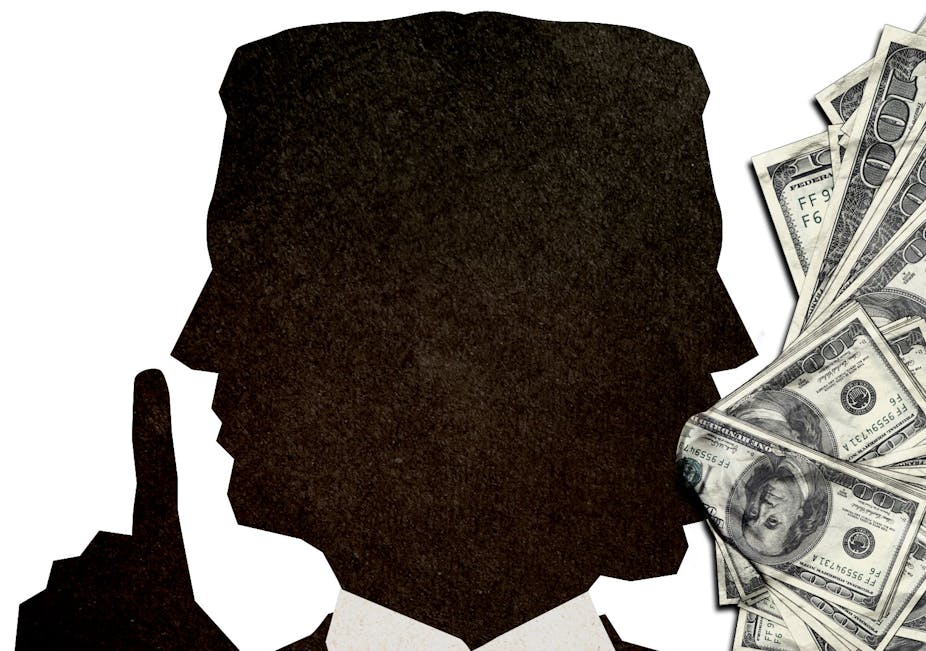Amid the “cash for causes” scandal currently unfolding in parliament, and the criticism of David Cameron’s “chumocracy” of elites at number 10, it’s worth remembering that degree to which politics is dominated by money is not a contemporary curse.
More than 2,000 years ago Aristotle worried about the power of the ancient oligarchs. One major difference is that political equality now is an ideal shared across the political spectrum. The political left and right may disagree about many things, but no one thinks more money should equate to a louder political voice. The problem is that, like everyday life, politics requires money.
The political stories are common enough, and they go back further than this week’s lobbying scandal. In March 2012 The Sunday Times reported claims that a £250,000 donation would get you “supper” with the Prime Minister. Before that there was the cash-for-peerages story. As Robert Peston put it in his book, Who Runs Britain?, Tony Blair sought “to confer political power on the wealthy for no other conspicuous reason than that they had the financial means to keep him in power”.
And party funding is not the only problem. Politicians like what can be called “oven-ready” ideas that can be implemented as policy quickly. Think tanks and lobby groups that produce these have an advantage. But think tanks must be funded, and there are few rules around this. The TaxPayers’ Alliance, for instance, does not declare the individuals or organisations that fund it nor how much they give.
Complex rules are not the solution. As tax laws show, complexity best suits those who have the resources to employ people to overcome it.
So here is a simple proposal. We give the super-rich a choice: pay a 100% tax on the wealth that makes them super-rich or have their political rights limited.
If they choose to keep their money, they can vote but they cannot lobby or meet politicians. They cannot fund political parties or think tanks; they cannot work for political parties; and they cannot control media outlets.
Using 2007 figures, Jeffrey A. Winters suggests that the USA’s super-rich, or “civil oligarchy”, is the top 0.1% of the taxpaying population with an average income of $4 million per year. On these figures my proposal implies an average 75% reduction to the super-rich’s wealth; but they would remain very wealthy.
In letting the super-rich choose, this proposal avoids the objections that a blanket tax would face. To update Adam Smith’s often-invoked quotation (“It is not from the benevolence of the butcher, the brewer, or the baker that we expect our dinner, but from their regard to their own interest”), James Dyson did not invent a new vacuum cleaner simply to improve the lives of millions of people he would never meet. He wanted to help himself and his family. My proposal lets the super-rich who value money over politics keep their wealth.
Second, not all of the super-rich have an interest in politics. Some want to fund the arts, medical research, or buy football clubs. Much of this is beneficial. In offering a choice, we can still benefit from the munificence of the Abramovichs and Sainsburys of this world.
But won’t the super-rich merely shift their income around to appear less wealthy? More broadly, why would they co-operate? These are problems but they are less pronounced than one may think. You don’t punish the super-rich for transgressions. You punish the policy wonk or politician. A lifetime ban on standing for office should suffice. We should also avoid the disease of making the best the enemy of the good. There is no perfect measure of wealth but we do measure it all the time. Anyone who has ever applied for a mortgage knows this.
One weighty moral objection is that a person’s political rights are sacred: we should not limit them, especially when the limitations apply to only some people. To make the point more vivid: replace “super-rich” with “women” or “Muslims” and the proposal looks repellent.
But the super-rich are given a choice; nothing is forced upon them. Equally, those who give up their political rights would only be reduced to a position similar to poor minority groups, such as transient migrant Polish workers. We think that human rights laws are sufficient for most minorities; and the super-rich do keep their right to vote on top of this.
But are they a special case? In one regard they are but this speaks in favour of my proposal. The super-rich are wanted by many states; they have a more effective exit option than most citizens. If they really don’t like the offer, some other country will take them.
Is the effort worth it? Arguably corporations are a greater threat to political equality. But there is an elegant solution here: simply define corporations as individuals. As they would almost certainly count as super-rich the proposal covers their influence too.
Imposing a choice on the super-rich neatly separates money from politics. But if you remain unconvinced perhaps we must wrestle with Aristotle’s problem for another two thousand years while the super-rich continue to run things from the top.

